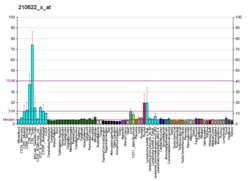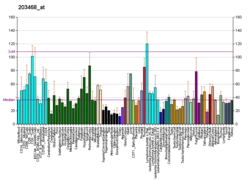Cyclin-dependent kinase 10
Appearance
(Redirected from CDK10)
| CDK10 | |||||||||||||||||||||||||||||||||||||||||||||||||||
|---|---|---|---|---|---|---|---|---|---|---|---|---|---|---|---|---|---|---|---|---|---|---|---|---|---|---|---|---|---|---|---|---|---|---|---|---|---|---|---|---|---|---|---|---|---|---|---|---|---|---|---|
| Identifiers | |||||||||||||||||||||||||||||||||||||||||||||||||||
| Aliases | CDK10, PISSLRE, cyclin-dependent kinase 10, cyclin dependent kinase 10, ALSAS | ||||||||||||||||||||||||||||||||||||||||||||||||||
| External IDs | OMIM: 603464; MGI: 2448549; HomoloGene: 55769; GeneCards: CDK10; OMA:CDK10 - orthologs | ||||||||||||||||||||||||||||||||||||||||||||||||||
| |||||||||||||||||||||||||||||||||||||||||||||||||||
| |||||||||||||||||||||||||||||||||||||||||||||||||||
| |||||||||||||||||||||||||||||||||||||||||||||||||||
| |||||||||||||||||||||||||||||||||||||||||||||||||||
| Wikidata | |||||||||||||||||||||||||||||||||||||||||||||||||||
| |||||||||||||||||||||||||||||||||||||||||||||||||||
Cell division protein kinase 10 is an enzyme that in humans is encoded by the CDK10 gene.[5][6][7]
Function
[edit]The protein encoded by this gene belongs to the CDK subfamily of the Ser/Thr protein kinase family. The CDK subfamily members are highly similar to the gene products of S. cerevisiae cdc28, and S. pombe cdc2, and are known to be essential for cell cycle progression. This kinase has been shown to play a role in cellular proliferation. Its function is limited to cell cycle G2-M phase. At least three alternatively spliced transcript variants encoding different isoforms have been reported, two of which contain multiple non-AUG translation initiation sites.[7]
Interactions
[edit]Cyclin-dependent kinase 10 has been shown to interact with ETS2.[8]
References
[edit]- ^ a b c GRCh38: Ensembl release 89: ENSG00000185324 – Ensembl, May 2017
- ^ a b c GRCm38: Ensembl release 89: ENSMUSG00000033862 – Ensembl, May 2017
- ^ "Human PubMed Reference:". National Center for Biotechnology Information, U.S. National Library of Medicine.
- ^ "Mouse PubMed Reference:". National Center for Biotechnology Information, U.S. National Library of Medicine.
- ^ Graña X, Claudio PP, De Luca A, Sang N, Giordano A (Jul 1994). "PISSLRE, a human novel CDC2-related protein kinase". Oncogene. 9 (7): 2097–103. PMID 8208557.
- ^ Brambilla R, Draetta G (Oct 1994). "Molecular cloning of PISSLRE, a novel putative member of the cdk family of protein serine/threonine kinases". Oncogene. 9 (10): 3037–41. PMID 8084611.
- ^ a b "Entrez Gene: CDK10 cyclin-dependent kinase (CDC2-like) 10".
- ^ Kasten M, Giordano A (Apr 2001). "Cdk10, a Cdc2-related kinase, associates with the Ets2 transcription factor and modulates its transactivation activity". Oncogene. 20 (15): 1832–8. doi:10.1038/sj.onc.1204295. PMID 11313931. S2CID 22792083.
Further reading
[edit]- Li S, MacLachlan TK, De Luca A, Claudio PP, Condorelli G, Giordano A (1995). "The cdc-2-related kinase, PISSLRE, is essential for cell growth and acts in G2 phase of the cell cycle". Cancer Res. 55 (18): 3992–5. PMID 7664269.
- Bullrich F, MacLachlan TK, Sang N, Druck T, Veronese ML, Allen SL, Chiorazzi N, Koff A, Heubner K, Croce CM (1995). "Chromosomal mapping of members of the cdc2 family of protein kinases, cdk3, cdk6, PISSLRE, and PITALRE, and a cdk inhibitor, p27Kip1, to regions involved in human cancer". Cancer Res. 55 (6): 1199–205. PMID 7882308.
- Bonaldo MF, Lennon G, Soares MB (1996). "Normalization and subtraction: two approaches to facilitate gene discovery". Genome Res. 6 (9): 791–806. doi:10.1101/gr.6.9.791. PMID 8889548.
- Crawford J, Ianzano L, Savino M, Whitmore S, Cleton-Jansen AM, Settasatian C, d'apolito M, Seshadri R, Pronk JC, Auerbach AD, Verlander PC, Mathew CG, Tipping AJ, Doggett NA, Zelante L, Callen DF, Savoia A (1999). "The PISSLRE gene: structure, exon skipping, and exclusion as tumor suppressor in breast cancer". Genomics. 56 (1): 90–7. doi:10.1006/geno.1998.5676. PMID 10036189.
- Sergère JC, Thuret JY, Le Roux G, Carosella ED, Leteurtre F (2000). "Human CDK10 gene isoforms". Biochem. Biophys. Res. Commun. 276 (1): 271–7. doi:10.1006/bbrc.2000.3395. PMID 11006117.
- Hartley JL, Temple GF, Brasch MA (2000). "DNA cloning using in vitro site-specific recombination". Genome Res. 10 (11): 1788–95. doi:10.1101/gr.143000. PMC 310948. PMID 11076863.
- Kasten M, Giordano A (2001). "Cdk10, a Cdc2-related kinase, associates with the Ets2 transcription factor and modulates its transactivation activity". Oncogene. 20 (15): 1832–8. doi:10.1038/sj.onc.1204295. PMID 11313931. S2CID 22792083.
- Wiemann S, Arlt D, Huber W, Wellenreuther R, Schleeger S, Mehrle A, Bechtel S, Sauermann M, Korf U, Pepperkok R, Sültmann H, Poustka A (2004). "From ORFeome to biology: a functional genomics pipeline". Genome Res. 14 (10B): 2136–44. doi:10.1101/gr.2576704. PMC 528930. PMID 15489336.
- Mehrle A, Rosenfelder H, Schupp I, del Val C, Arlt D, Hahne F, Bechtel S, Simpson J, Hofmann O, Hide W, Glatting KH, Huber W, Pepperkok R, Poustka A, Wiemann S (2006). "The LIFEdb database in 2006". Nucleic Acids Res. 34 (Database issue): D415-8. doi:10.1093/nar/gkj139. PMC 1347501. PMID 16381901.
- Wissing J, Jänsch L, Nimtz M, Dieterich G, Hornberger R, Kéri G, Wehland J, Daub H (2007). "Proteomics analysis of protein kinases by target class-selective prefractionation and tandem mass spectrometry". Mol. Cell. Proteomics. 6 (3): 537–47. doi:10.1074/mcp.T600062-MCP200. hdl:10033/19756. PMID 17192257.
External links
[edit]- CDK10+protein,+human at the U.S. National Library of Medicine Medical Subject Headings (MeSH)







